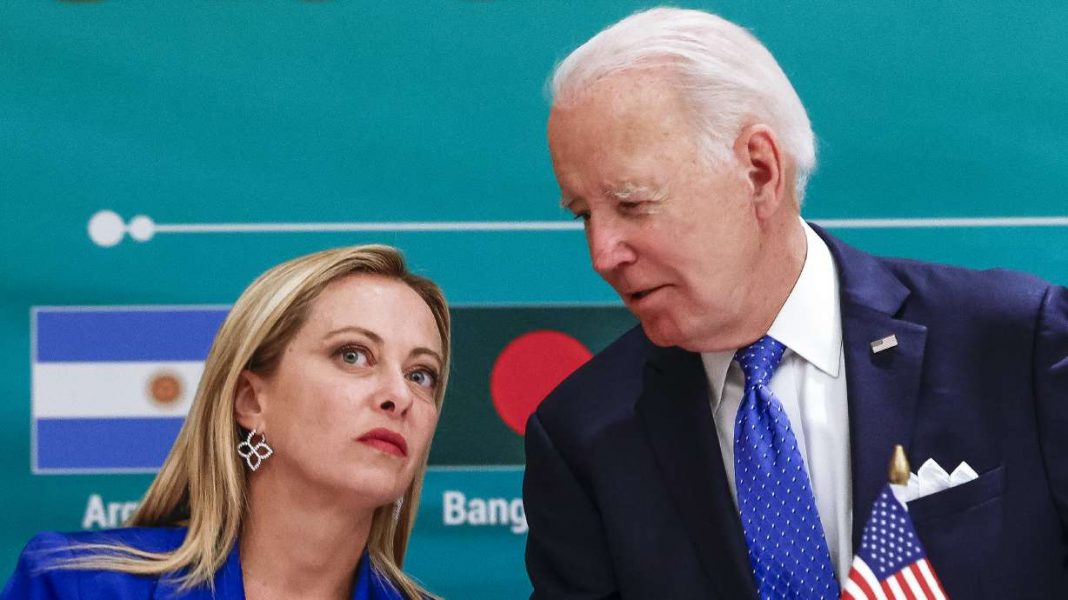WASHINGTON — President Joe Biden announced on Friday that the U.S. will initiate airdrops of humanitarian aid into Gaza. This decision comes in the wake of a tragic incident involving Israeli troops and Palestinians, which resulted in over 100 deaths.
The president’s announcement followed a chaotic day where at least 115 Palestinians lost their lives and over 750 were injured. This occurred when Israeli troops reportedly opened fire on large crowds attempting to retrieve goods from an aid convoy, according to the health ministry run by Hamas in Gaza.
President Biden assured that the airdrops would commence shortly. He also mentioned that the U.S. is exploring other avenues to expedite the delivery of much-needed aid to the war-torn region, in an effort to alleviate the suffering of the Palestinian people.
“In the days ahead, we will collaborate with our allies in Jordan and others to provide additional food and supplies through airdrops. We are also considering the possibility of establishing a marine corridor,” Biden stated.
Although the president mentioned airdrops in the context of Ukraine, White House officials clarified that he was referring to Gaza.
Israel has claimed that many of the casualties were due to a stampede caused by the chaos, and that their troops only fired at individuals who appeared to pose a threat. The Israeli government is currently investigating the incident.
The announcement was made during a meeting with Italian Prime Minister Giorgia Meloni at the White House.
“The aid reaching Gaza is grossly insufficient,” Biden emphasized. “Innocent lives, including those of children, are at stake. We cannot stand by until more aid is delivered. We should be sending hundreds of trucks, not just a few.”
The White House, State Department, and Pentagon had been considering the feasibility of U.S. military airdrops for several months. However, they had reservations due to concerns about the efficiency of this method, the inability to ensure that the aid reaches civilians, and its inability to replace overland aid deliveries.
Officials stated their preference for increasing overland aid deliveries through the Rafah and Kerem Shalom border points and persuading Israel to open the Erez Crossing into northern Gaza.
The incident on Thursday seemed to have tipped the scales, prompting Biden to approve airdrops. White House national security spokesman John Kirby acknowledged the complexity of airdrop operations, but emphasized the urgent need for aid in Gaza.
He reiterated that ground routes will continue to be used for aid delivery, and that airdrops are an additional measure.
“Such decisions are not made lightly. They require careful consideration,” Kirby said. “Few military operations are more complex than humanitarian assistance airdrops.”
There has been increasing pressure on Biden to take more decisive action to alleviate Palestinian suffering, including from members of his own Democratic Party. Even before Thursday’s incident, Sen. Jack Reed, chairman of the Senate’s Armed Services Committee, wrote to Biden urging the deployment of a military hospital ship and support units to treat Gaza’s wounded and open a sea route for the delivery of humanitarian aid.
During his meeting with Meloni, Biden also sought to reassure European leaders of the U.S.’s continued support for Ukraine. However, he has been unable to secure the passage of a supplemental foreign aid package that includes $60 billion for Ukraine, in addition to $35 billion for Israel and Taiwan. The legislation has been approved by the Senate, but Republican Speaker Mike Johnson has refused to bring it to a vote in the House.
White House officials admitted that they are struggling to find a solution to the deadlock with House Republicans and resume the flow of American aid to Kyiv, which is desperately needed as Ukraine tries to resist Russia’s invasion.
Biden, along with top Democrats and Senate Republican Leader Mitch McConnell, strongly urged Johnson during a White House meeting this week to consider the foreign aid package. However, Johnson responded by stating that Congress “must prioritize America’s needs first.”
The leaders also discussed the roles of the U.S., Egypt, and Qatar in brokering an extended cease-fire between Israel and Hamas, Italy’s priorities for a G7 presidency, the influx of migrants into Italy from North Africa, and their respective China policies.
Earlier this week, Biden expressed optimism that a cease-fire deal could be reached by early next week. However, he acknowledged that the incident on Thursday may have delayed the prospective deal.
With Meloni by his side, Biden expressed cautious optimism on Friday that a deal can still be reached.
“We’ve been working diligently, and we hope to have an answer soon,” Biden said.
Meloni emphasized that resolving the humanitarian crisis in Gaza is Italy’s top priority.
“We need to coordinate our actions to prevent an escalation, and in this regard, we fully support the U.S. mediation efforts,” she said.




Agree: Military aid to Gaza will only escalate the violence and harm innocent civilians.
Disagree: Military aid is necessary to maintain stability and protect against further escalation.
Agree: Military aid will only worsen the situation and lead to more casualties. Diplomatic solutions are needed to achieve lasting peace.